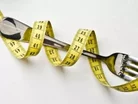Using a big fork helps you eat less

A restaurant-based study has found that diners who used bigger forks to eat their meals with tended to eat less.
Previous studies into eating habits have tended to look at portion sizes, but two researchers had the idea that bite sizes could also influence how much we eat and when we feel full.
They found that restaurant visitors who were eating with a fork that was 20 percent bigger than the establishment’s ‘normal’ size of cutlery, ate less and left more food on their plates.
READ MORE FROM THE WDM CONTENT NETWORK:
To read the latest edition of Healthcare Global, click here
- By 2015 flu vaccine production will have doubled
- DNA is responsible for European junk food addictions
- Conference Highlights app keeps UK doctors up-to-date
The study was based at a popular Italian restaurant in the southwest of America.
Tables were given two different sizes of cutlery and plates were weighed before the food was sent out of the kitchen to the customers.
A note was placed on the bottom of the plate indicating whether it had been a small or big fork table and the plates were weighed for a second time to measure how much food had been eaten.
However, once the researchers tested this theory in the laboratory, they found it was only applicable in a restaurant environment.
In the second study, people who ate Italian food with a larger fork while in the lab ate more than those using larger forks in the restaurant.
Commenting on the results, the researchers said the restaurant diners had a “well-defined goal of satiating their hunger, and, because of this well-defined goal, they are willing to invest effort and resources to satiate their hunger.”
They believed that the restaurant diners who had been given the small forks may have had “a feeling that they were not making much progress” towards their goal of fulfilling their hunger, so they ate more food on their plate.
They felt that people who ate in the lab knew they were taking part in the study and did not have the same motivation of fulfilling hunger as the participants in the restaurant.



